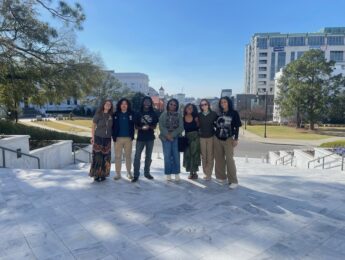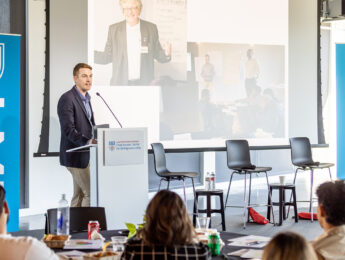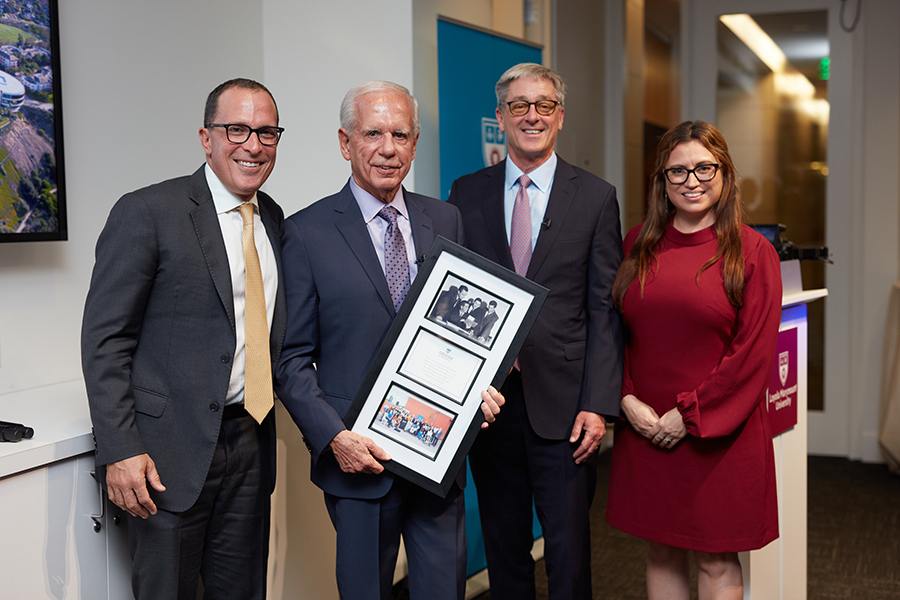
Ministry takes many shapes and forms. For Tony Coelho ’64, primary author of the Americans with Disabilities Act (ADA) and founder of The Coelho Center for Disability Law, Policy and Innovation based at LMU Loyola Law School (LLS), the quest to secure legal equity for those with disabilities became a lifelong vocation – a calling that extended far beyond his initial intention to join the priesthood.
Coelho is a former six-term Democratic congressman from California, and he has served as House Majority Whip. His political career has been shaped by his ongoing advocacy for disability rights, a mission that emerged during his undergraduate years at LMU when he discovered that he suffered from epilepsy. Coelho associates that period of his life with the transformative support and encouragement he received from the LMU community, and he was shocked by the discrimination he later faced in the outside world. “It’s very hurtful when people dislike me just because of who I am,” he said. “We should all be getting to know each other. As a person with a disability, I can be very successful just like anyone else – and if you give me an opportunity to fail, then I might have a chance to succeed.”
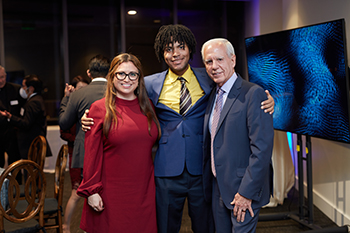
The ADA, perhaps Coelho’s greatest political success, is widely recognized as among the most important pieces of civil rights legislation within the last 35 years. Nonetheless, Coelho has never overlooked the need for continuing advocacy. Before the act was signed in 1990, it was legally permissible for an individual in a wheelchair to be denied entry to a cinema, or to ask a partially sighted person to leave a restaurant if they were unable to read the menu. This type of discrimination seems unconscionable today; unfortunately, the battle is far from won. Over the decades, Coelho has been working tirelessly to sustain and advance the impact of the ADA, advocating for the ratification of the U.N. Convention on the Rights of Persons with Disabilities and working directly with leaders including former Presidents George H.W. Bush, Bill Clinton, George W. Bush, and Barack Obama to secure employment rights for those with disabilities. Most importantly, Coelho recognized that the disability community is poorly represented within the legal profession and the political sphere, and therefore unable to influence and inform the laws that define their lives.
That insight was the spark that initiated the founding of The Coelho Center in 2018 with a $5 million endowment, including $1 million from the Coelho family. “People with disabilities bring a different perception to the law,” said the director of The Coelho Center, Katherine Pérez. “We cannot collectively achieve positive change without prioritizing their voices and experiences – disability rights affect every sector of society.”
To achieve this goal of inclusion and influence, The Coelho Center has established a three-part mission: to convene thought leaders to address disability issues; to leverage technology to improve lives; and to create a pipeline of lawyers with disabilities who will go on to serve as attorneys, judges, and public policy professionals, thereby increasing representation in the spaces where decisions are being made. As the disability rights slogan goes, “Nothing About Us Without Us!”; in other words, people with disabilities must be given access to participate in any decision pertaining to their rights, thereby serving to strengthen a society that thrives on inclusivity and difference of ability.
“LMU played a huge role in giving me my strength to be who I am, and I decided to establish The Coelho Center at Loyola Law School because of their focus on access to justice for all.”
-Tony Coelho
The Coelho Center holds a special place within the culture of LLS, championed by Dean Michael Waterstone, whose career has centered on disability law. “As a lifelong scholar and advocate on disability law issues, I could not be more proud to house The Coelho Center here on the Loyola Law School campus,” said Waterstone. “We are uniquely situated to make a difference on a broad range of issues, including expanding the pipeline of students with disabilities who attend law school, and generating knowledge related to the implementation and enforcement of laws. Under the leadership of Katherine Pérez, we maintain the ability to connect with our grassroots allies and create linkages to government, business, and the academy.”
The Coelho Center also engages in regular collaborations with the other six LMU schools and colleges. “My requirement for the gift was that it would be university-wide, because each college is impacted by disability,” said Coelho. “Provost Thomas Poon has done a tremendous job in encouraging this interdisciplinary approach, recognizing the necessity of combining different areas of expertise to develop creative solutions.” From exploring the future of assistive technology within LMU Frank R. Seaver College of Science and Engineering, to investigating options for more accessible online learning in the LMU School of Education, The Coelho Center draws upon the power and resources of the entire university. These interdisciplinary initiatives are complemented by conferences, roundtables, and events throughout the year, bringing together thought-leaders, advocates, and policy makers to discuss and create agendas that foreground the political participation of the disability community.
In addition to convening the best and the brightest leaders through its programming, The Coelho Center also seeks to nurture the next generation of leaders via The Coelho Center Law Fellowship Program, the only program of its kind in the United States. Far too often, students with disabilities are discouraged from attaining higher education, preventing them from achieving careers in law and policy. The fellowship seeks to create a pathway for these students, providing mentorship and training to encourage talented young individuals to apply their skills and put their values into practice. To date, more than 15 program alumni have applied to law school, while others are impacting disability policy via local government initiatives and national campaigns.
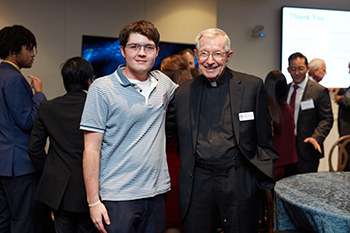
Ultimately, it is the fellows who manifest the mission of The Coelho Center; they are the ones who will take its mission into the future, centralizing disability rights across all sectors of society. “I think what we’re doing in the fellowship program is truly innovative and progressive,” said Abigail Gutleben ’23, a current student at College of William & Mary in Williamsburg, Virginia. “There is an attitude of acceptance that I haven’t found in other professional spaces. I love the atmosphere of inclusion, and I’m hoping that we can bring this to areas beyond the fellowship.”
The Coelho Center’s presence can be felt throughout the Westchester campus. Recently, as part of a collaboration with Verizon to pilot the latest accessible audio wayfinding technology, an infrastructure-free audio system was installed on campus to assist individuals who are affected by vision impairments and restricted mobility. Operating seamlessly across interior and exterior spaces, turn-by-turn audio instructions guide the user safely to wherever they wish to go. The university’s attention to the needs and experience of those with disabilities has also been influenced by a collaboration between the Thomas and Dorothy Leavey Center for the Study of Los Angeles (Study LA) and The Coelho Center. As part of the StudyLA Los Angeles Public Opinion Survey, a series of questions were strategized to discern the extent to which disability affects the urban population, revealing that 21 percent of those surveyed identify as a person with a disability, and 14 percent do not have any kind of health insurance.
This data-driven understanding of the pervasiveness of living with a disability has informed several initiatives to advance the societal integration of people with disabilities. That integration starts by granting the power to affect policy, and something as simple as casting a vote can have a radical effect. “As advocates successfully turn each corner on their journey to develop a fair and just election system, they still encounter barriers based on disability, limited English proficiency, economic status, racial divisions, and more,” said Pérez. Following the Voter’s Choice Act in 2018, The Coelho Center commissioned a poll on the disability electorate, which identified voting motivations and turnout likelihood, and the findings led to the public event “Breaking Barriers to Voting: An Ongoing Advocacy” at the Playa Vista campus. The discussion among party leaders, voting-rights experts, and other stakeholders brought an intersectional perspective to voting access, recognizing that discrimination against disability is inseparable from the oppression of members from multiple disenfranchised groups.
“The Power of TV: Representing Disability in Storytelling” was another major event in which The Coelho Center was involved, hosted at the Saban Media Center in North Hollywood. Speaking alongside showrunners, producers, and actors, Pérez made the case for introducing a new paradigm of disability to popular media – one which moved away from emphasizing pity and otherness, and toward a celebration of different abilities and the flourishing of a diverse society. Given that one in four people identify as having a disability, Pérez has argued that authentic representation will not be achieved until one in every four characters are presented as having a disability, an attitude of inclusivity that would significantly shape public perception and policy decisions.
These are just a few of the many initiatives at The Coelho Center, demonstrating how disability rights are relevant to every sphere of life. As people with disabilities continue to face discrimination and barriers to their full participation in society, LLS and the university, as a whole, are developing the knowledge, network, and tools to tackle these challenging problems. The Coelho Fellows bring that mission forward into the world, converting ideas incubated on campus into tangible impact – from new technologies to pioneering policies. As Coelho Fellow Angelica Vega ’22 has put it, “we are experts of our own lived experience.”
Coelho agrees. “I don’t see my epilepsy as a negative; I thank God for my disability, because it has made me a stronger and better person,” he said. “LMU played a huge role in giving me my strength to be who I am, and I decided to establish The Coelho Center at Loyola Law School because of their focus on access to justice for all.” As Coelho discovered early in life, sometimes a personal calling requires some reading between the lines – he may not have become a priest, but he learned that he could find fulfillment in a way that transcended his original intention. “I’ve had so many good things happen in my life,” he said. “So, I decided to give back by making an impact in the lives of those of us with disabilities. I want this to be my legacy.”
To learn more about supporting LMU Loyola Law School, contact Jamal Barakat, director of development, at jamal.barakat@lmu.edu, 310.568.7148. You can also give directly to The Coelho Center here.



